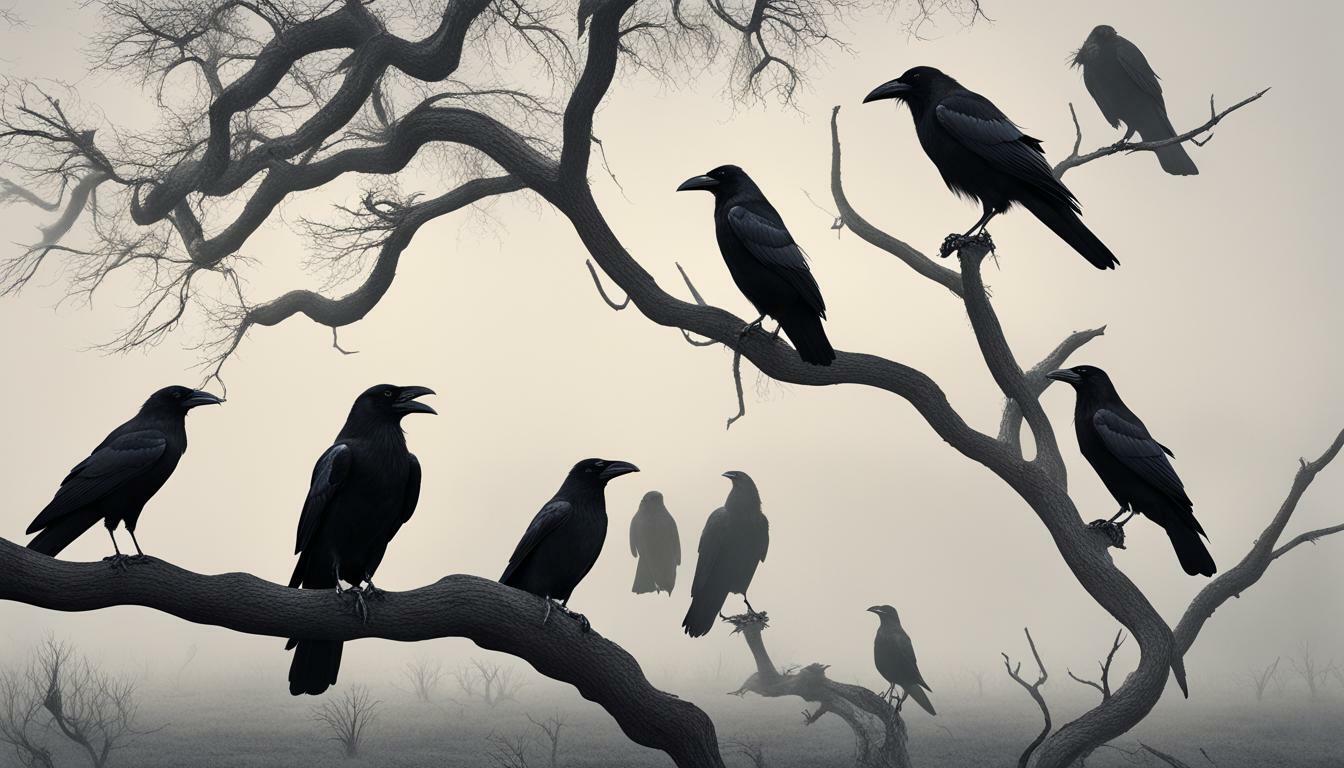For centuries, crows have been associated with death, and their symbolic meaning has varied drastically from culture to culture. From ancient mythology and folklore to modern-day superstitions, the belief in crows as omens of death has been deeply embedded in many societies.
Although the cultural significance of crows may differ, the symbolism of these birds remains a constant. Their black feathers, loud caws, and often solitary nature have led many to associate them with death and darkness.
Whether you believe in the supernatural or not, the myth surrounding crows and death is a fascinating topic to explore. In this article, we will delve into the cultural, mythological, and scientific explanations behind this longstanding belief.
Key Takeaways:
- The belief in crows as omens of death has existed for centuries.
- Cultural beliefs about crows and their symbolism vary across different societies.
- The black feathers, loud caws, and solitary nature of crows have contributed to their association with death.
The Cultural Significance of Crows
Crows have played a significant role in various cultures throughout history. In some cultures, crows are seen as symbols of death, while in others they are seen as messengers of the afterlife. Understanding the cultural significance of crows can provide insight into the beliefs and values of different societies.
Superstitions about crows have been present in many cultures. For instance, in some African cultures, crows are believed to be the souls of ancestors that have returned to the mortal world. In European cultures, crows have been associated with witchcraft, and it was believed that witches could turn themselves into crows to fly undetected.
The meaning of crows in relation to death varies between cultures. In some cultures, crows are seen as a sign of impending death, while in others, they are perceived as protectors of the soul after death. In Native American culture, crows are believed to lead the soul of the deceased to the afterlife.
Specific cultural rituals and practices associated with crows and death also exist. In China, the annual Qingming Festival involves burning paper effigies of crows as a way to pay respect to the deceased. In Hinduism, crows are fed during a ceremony called the Shraddha, which honours ancestors.
Overall, the cultural significance and superstitions surrounding crows demonstrate the diverse ways in which humans have attempted to make sense of death and the afterlife.
Crows in Mythology and Folklore
Crows have been associated with death and the afterlife in many cultures around the world. They have been depicted as death omens and messengers between the mortal world and the spiritual realm. Their black feathers and mysterious behavior have added to their reputation as creatures of the night and symbols of the unknown.
In Native American cultures, crows were often seen as tricksters and shape-shifters, with the power to transform between human and bird form. They were also believed to possess healing powers and were revered for their intelligence and adaptability. Some tribes even saw crows as spiritual guardians, protecting the living from evil spirits.
In European folklore, crows were often associated with witches and dark magic. They were believed to be attracted to the scent of death and were often seen hovering above battlefields and graveyards. In some myths, crows were seen as the souls of the departed, guiding the dead to the afterlife.
In Hinduism, crows were considered sacred birds and were associated with the god of death, Yama. They were believed to be messengers of the god, delivering souls to the afterlife and guarding the gates of heaven.
Despite their ominous reputation, not all cultures view crows as symbols of death. In Japan, they are considered to be symbols of good luck and are often seen as protectors of the home. They are also associated with wisdom, strength, and longevity.
The symbolism of crows as death omens or messengers of the afterlife continues to be explored in modern literature and pop culture. They have appeared in countless horror films and novels, cementing their reputation as ominous creatures of the night.
Scientific Explanations for Crow Behavior
While many cultures believe that crows are messengers of death, science offers a different perspective on their behavior.
Firstly, crows are highly intelligent creatures known to form complex social structures and show problem-solving skills. Their attraction to certain environments, such as cemeteries, may be a result of their adaptation to human habitats.
Furthermore, large gatherings of crows are often observed near areas with high food availability, such as garbage dumps or open fields. These groups, known as murders, may be misconstrued as death omens when they are simply attracted to a nearby food source.
Additionally, crows are known to exhibit playful behavior, performing acrobatic feats in the air or playing games with other birds. Misinterpreting this behavior as a sign of death may stem from cultural traditions rather than actual observation.
Overall, while crows may still hold symbolic meaning for some cultures, it is important to consider scientific explanations for their behavior in order to understand the true nature of their actions.
Crows and Death: Real-Life Experiences and Anecdotes
Encounters with crows in relation to death are not uncommon and have been documented across cultures and time periods. These experiences and anecdotes give us a glimpse into the symbolic significance of crows and their connection to death.
“When my grandmother passed away, a murder of crows gathered outside her window. They stayed there for hours, eerily silent. It felt like they were paying their respects.”
Many people have reported seeing crows near the homes of loved ones who are close to death or have recently passed away. This has led to the belief that crows are messengers of death or are somehow drawn to the energy of death.
“I’ve been a funeral director for over 20 years and have seen crows at countless funerals. It’s almost as if they’re there to guide the deceased’s soul to the afterlife.”
Professionals in related fields have also shared their observations of crows in relation to death. For example, funeral directors have reported seeing crows perched on gravestones or circling above cemeteries during burial services.
“My great-grandmother always said that if a crow sits on your roof, it means someone in the house will die soon. I was skeptical until a few days later when my grandfather passed away.”
Many families have passed down superstitions about crows as death omens, adding to the cultural significance of these birds.
While these experiences cannot be scientifically explained, they are a reminder of how deeply ingrained the connection between crows and death is in our cultural beliefs.
Conclusion
So, do crows mean death is near? The belief in crows as omens of death is deeply rooted in cultural traditions and superstitions. While some view them as messengers or harbingers of death, others see them as symbols of life, intelligence, and adaptability.
It’s important to understand the different perspectives when exploring the symbolic meaning of crows in relation to death. While science may offer explanations for crow behavior, cultural beliefs and superstitions will continue to shape our perceptions and interpretations.
In conclusion, crows are complex and fascinating creatures that have inspired myths, legends, and superstitions throughout history. Whether you see them as symbols of death or life, their symbolism is undeniable and has captured the human imagination for centuries.
So next time you spot a crow, take a moment to appreciate their beauty and significance. And remember: while they may be associated with death in some cultures, their presence alone does not necessarily mean that death is near.
Can Birds Hear Death Approaching, and Does It Relate to Their Ear Structure?
Can Birds Hear Death Approaching, and Does It Relate to Their Ear Structure? The phenomenon of birds hearing unveiled has intrigued researchers for years. Recent studies suggest that birds possess incredible auditory capabilities, allowing them to detect impending danger, including the approach of death. While their unique ear structure might provide cues about potential threats, further investigation is needed to fully understand this remarkable ability.
FAQ
Q: Do crows really symbolize death?
A: While crows have been historically associated with death in some cultures, it is important to note that this belief is rooted in cultural traditions and superstitions. In reality, crows are highly intelligent birds with complex social behavior.
Q: Are crows considered to be omens of death?
A: In certain cultures, crows have been seen as omens of death. However, it is crucial to understand that this belief is based on cultural interpretations and folklore rather than scientific evidence.
Q: What is the scientific perspective on crow behavior?
A: Scientists explain crow behavior through factors such as their intelligence, adaptability, and social nature. Crow movements or gatherings that are often associated with death omens can be better understood as natural behavior patterns.
Q: Are there any real-life anecdotes that support the belief in crows as death symbols?
A: While there are anecdotes and stories shared by individuals who have encountered crows in relation to death or experienced their symbolism firsthand, it is important to consider these as personal experiences and not definitive evidence.
Q: What should I consider when exploring the symbolic meaning of crows in relation to death?
A: When exploring the symbolic meaning of crows in relation to death, it is crucial to take into account cultural beliefs and traditions, as well as scientific explanations for crow behavior. Understanding multiple perspectives can provide a broader understanding of the topic.











